Some Dams In Iran Stand At Less Than 37% Capacity: MP
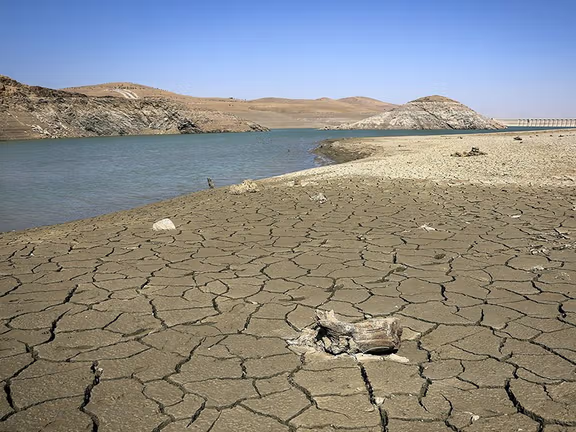
A lawmaker in Iran has expressed concern over the critical water situation, saying that “some dams have reached less than 37% of their capacity.”

A lawmaker in Iran has expressed concern over the critical water situation, saying that “some dams have reached less than 37% of their capacity.”
Hadi Beiginejad, member of Iranian parliament's energy commission, told ISNA website in Tehran Thursday that the country is not in a good situation in terms of water resources, adding that even the claim that 37% of dams are full may not be true.
“Based on the research I did, some reservoirs for some dams are much less than 37%,” he underlined.
On the other hand, according to latest official statistics of Iran Water Resources Management Company, two important water supply dams, namely Lar in Tehran and Ekbatan in the western city of Hamedan, have only two percent reserves.
The company also reported that among the important dams that supply drinking water, 11 have a reserve rate below 20% of their capacity.
According to the same statistics, the total water reserves of the country's dams are about 18 billion cubic meters, and on average, about 63% of the country's dam reservoirs are empty.
In the capital, however, the situation is worse and Tehran's dams with 279 million cubic meters of reserves are experiencing an unprecedented shortage in the past fifty years.
Earlier, Alireza Almasondi, Vice President of Water Resources Management Company, said 84 cities in Iran are struggling with water crisis.
Many years of drought and decades of mismanagement have led to chronic water shortages in most parts of Iran.
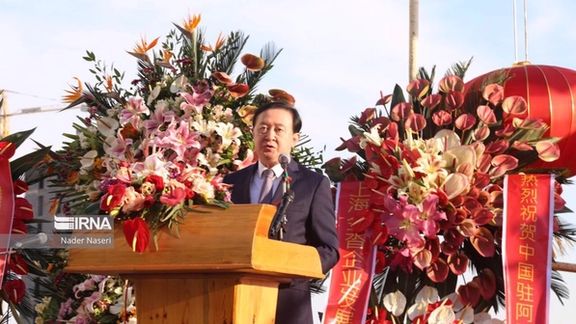
Despite a recent controversy about China siding with the United Arab Emirates against Iran, Beijing’s Consulate General officially opened in Bandar Abbas, a key port city.
In his address at the official opening ceremony of the consulate, Chinese Ambassador to Iran Chang Hua hailed the move as a fresh "landmark moment in China-Iran relations," adding that Beijing considers ties with the Islamic Republic “strategic.”
However, earlier this month during a visit to Saudi Arabia by Chinese President XI Jinping, China had signed off on a joint statement with the Gulf Cooperation Council, where a UAE claim on three Iranian islands were mentioned. This led to an avalanche of criticism against the Iranian regime, which has been boasting about its strategic ties with Beijing.
Noting that China supports and respects Iran’s national sovereignty and territorial integrity, Chang said “China decisively supports Iran against foreign intervention and for preserving its national sovereignty, territorial integrity, and national dignity.”
He highlighted that China sees ties with Iran from a strategic point of view, reaffirming Beijing’s determination to expand its partnership with Iran based on bilateral agreements as well as the 25-year comprehensive cooperation agreement between the two countries.
The opening of the consulate is described as an opportunity to actively implement the 25-year deal and China’s ambitious Belt and Road Initiative, a global infrastructure development strategy to invest in nearly 150 countries and international organizations. The BRI, originally named, “One Belt, One Road,” is an international development strategy as China looks to expand its influence worldwide by improving trade routes. As of December 2021, China had expanded its’ BRI—which includes infrastructure developments across land corridors, in ports, across maritime routes, as well as over-land links (bridges, tunnels, etc.)— into 142 countries. Developing diplomatic relations with Iran is crucial to China’s ability to implement the BRI.
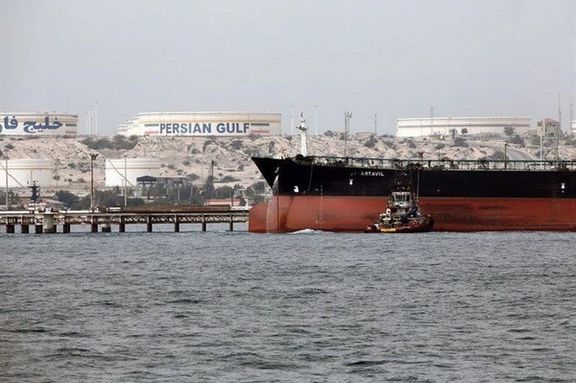
Adel Shahrzad, the deputy governor of Hormozgan province where the port is located, said during his speech that Iran's southern provinces look forward to increasing cooperation with China, adding that the opening of the consulate general will play an important role in developing bilateral relations and enhancing exchanges in various fields.
The area of responsibility of China's Consulate General in Bandar Abbas includes eight Iranian provinces in the south, namely Khuzestan province, Chaharmahal and Bakhtiari, Kohgiluyeh and Boyer-Ahmad, Fars, Bushehr, Kerman, Hormozgan, and Sistan-Baluchestan province.
Reports of the imminent inauguration of the consulate were circulating in media since at least a year ago but its final move can be seen as a sign of détente following the controversial joint statement by China and the GCC about three Iranian islands in the Persian Gulf.
Iran’s Council of Ministers approved the opening of a Chinese consulate in Bandar-Abbas, Iran’s most significant trading and military port on December 29th, 2021—China’s first consulate in Iran. While at face value this may seem like a benign partnership between two developing countries, it might have far-reaching significance for Iran and the region.
The new Chinese consulate in Bandar-Abbas will share its home with The Islamic Revolutionary Guard Corps’ main naval base. Iran’s invitation of an emerging global superpower into their backyard could pose a threat to Iran, should regional disputes one day arise. China has already “attempted to claim more internal waters, territorial sea, exclusive economic zone, and continental shelf than it is entitled under international law,” the spokesman of the US Navy’s Seventh Fleet said in 2019.
Although bilateral trade has declined in the past two years, China is still Iran’s top trading partner, buying illicit Iranian crude oil in the face of US sanctions. However, out of the two, China alone has enjoyed a favorable trade partnership, while Iran has been isolated internationally by essentially only being able to trade with China, forcing Iran to trade its oil reserves at much lower prices than it would otherwise like, although no official figures are available.
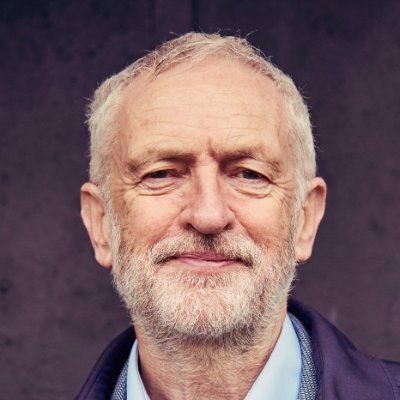
Prominent British Labor member of parliament Jeremy Corbyn has condemned the execution of protestors in Iran saying that it is “deplorable”.
In a tweet on Tuesday, Corbyn said he has written a letter to Iran’s Chief Justice Gholamhossein Mohseni Ejei urging him to reverse the convictions.
“I have been informed that at least 26 people are at risk of being executed…Many of the individuals involved have been denied fair trials, including the right: to access a legal counsel of their choosing; to be presumed innocent until proven guilty; to remain silent; and to receive a fair, public hearing,” reads the letter Corbyn published on twitter.
He also noted that there are reports that several defendants were tortured to induce “confessions”, which were later used as evidence in court.
Corbyn urged the regime to immediately reverse all convictions and death sentences of protesters and release those who have been detained for exercising their rights to freedom of expression, association, and peaceful assembly.
Holding fair trials, having access to legal counsel, and throwing out evidence acquired through use of forced confession were among the other things Corbyn urged the Islamic regime to do.
Iran has been the scene of nationwide anti-regime protests since mi-September. Over 500 people have been killed by security forces and more than 18,000 are imprisoned.
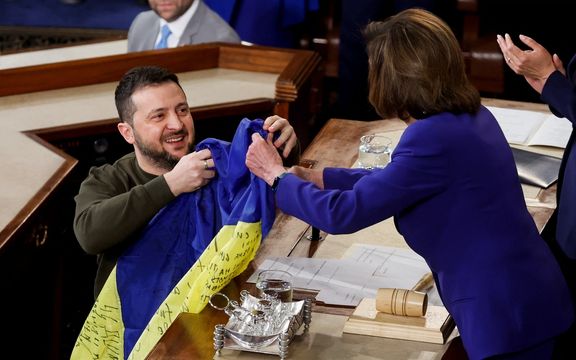
Iran is a partner in Russia’s “genocidal policy” by supplying drones, Ukrainian president Volodymyr Zelenskiy told a joint session of the US Congress on Wednesday.
In a historic visit to Washington and his first trip abroad since Russia’s invasion began in February, Zelenskiy addressed the United States Congress, thanking for American economic and military assistance and saying that his country is fighting not only to defend itself but security in Europe.
The United States is preparing to deliver Patriot air defense systems to Ukraine after repeated Russia missile and drone attacks on energy infrastructure and other civilian targets. Iran has supplied hundreds of kamikaze drones to Russia that have been used in these attacks.
“If your Patriots stop the Russian terror against our cities, it will let Ukrainian patriots work to the full to defend our freedom,” Zelenskiy said. He added that Russia uses missile attacks to destroy Ukrainian cities.
“More than that, Russia found an ally in this — in this genocidal policy: Iran. Iranian deadly drones sent to Russia in hundreds — in hundreds became a threat to our critical infrastructure. That is how one terrorist has found the other,” Zelenskiy said.
Nato members have strongly condemned Iran for delivering the drones and have imposed punitive sanctions against individuals and companies involved in the production and delivery of the weapon.
The issue of Iranian drones and a growing military alliance between Tehran and Moscow have also hurt the prospects for further talks over Iran's nuclear program and the lifting of crippling sanctions on its economy.
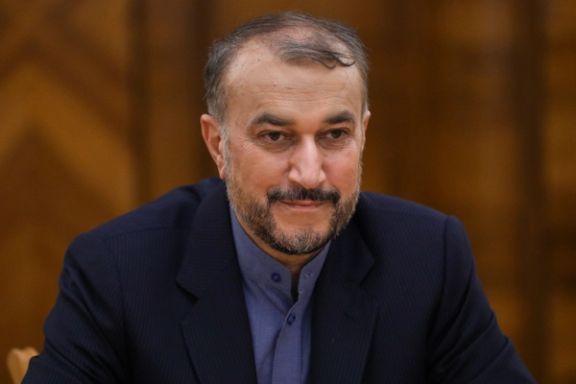
Islamic Republic's Foreign Minister says his Saudi counterpart has assured him of Riyadh’s willingness to continue negotiations with Tehran.
Hossein Amir-Abdollahian made the remarks Wednesday saying he held talks with Saudi Arabia’s foreign minister Prince Faisal bin Farhan Al Saud at a conference in Jordan the previous day.
“I had the chance to have friendly talks with my counterparts on the sidelines of Baghdad II conference...my Saudi counterpart assured me of his country's willingness to continue the dialog with Iran,” Amir-Adollahian tweeted.
Jerusalem Post reported that the Saudi foreign ministry did not immediately respond to a request for comment.
The Iranian minister’s claim comes after observers commented Tuesday that there was no breakthrough between the two countries during the one-day summit.
The Second Baghdad Conference for Cooperation and Partnership was jointly organized by Iraq and France to support stability in Iraq and the wider region where Tehran and Riyadh have backed opposite sides in proxy wars.
Saudi Arabia and Iran severed ties in 2016 and the meeting offered potential for direct talks.
“We are ready to cooperate with all countries in the region including countries south of the Persian Gulf,” Amir-Abdollahian said. In his address, the Saudi minister pledged support for Baghdad but made no reference to relations with Iran.
Tehran has intensified its rhetoric against Riyadh since the eruption of protests in Iran with the Revolutionary Guard telling Saudi Arabia to control its media and the Iranian intelligence minister warning that there was no guarantee of Tehran continuing its “strategic patience”.
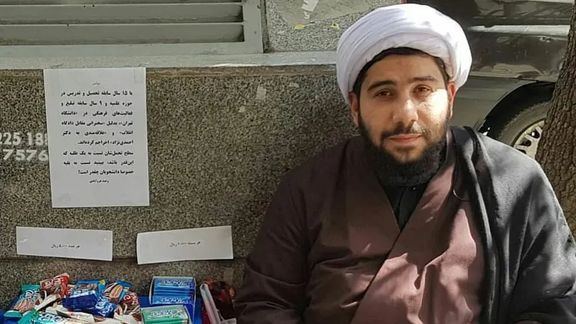
An Iranian dissident cleric, who was sentenced to prison due to his anti-regime writings, has been transferred to Tehran's notorious Evin prison to serve his term.
Maryam Jafari Azarmani, wife of the jailed cleric Vahid Heroabadi said Tuesday on twitter that her husband has been taken to Evin Prison while he has one more case pending against him.
Posting content on social media, Vahid Heroabadi was tried in the summer of 2020 by the Special Court of the Clergy on charges of “spreading lies with the intention of disturbing public opinion and propaganda activities against the state.”
The cleric, who is reportedly grown at odds with the regime, was detained at the Bazargan border with Turkey on May 31.
He formerly worked as a cultural missionary at Tehran University. However, he continued to slam policies like mandatory hijab, internet filtering, the persecution of Baha’is, a religious minority, and wide-ranging censorship of public discourse.
Once he wrote about the Baha’i community, “We can have two approaches. Killing the Baha'is, or [accepting] that they are our compatriots, Iranians, with social rights…. In the end it will be one of these two, and I will definitely be choosing the second one.”
After being dismissed from the university in 2018, he started selling small items in downtown Tehran while his photos dressed in his religious robes went viral.